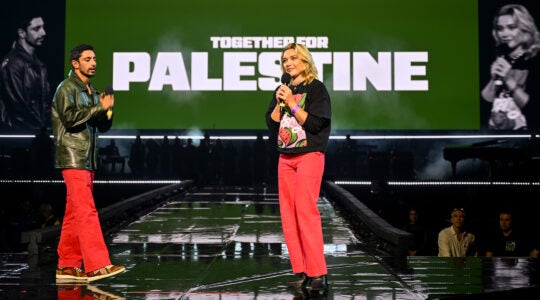
Today is the Day of the Salvation of the Bulgarian Jews and of the Victims of the Holocaust and of the Crimes Against Humanity. Under a bright cloudless sky, a crowd of about 150 gathered this morning opposite the National Assembly building in Sofia for a memorial ceremony.
It was a highly choreographed affair: After a brief speech and the national anthem, each of the gathered dignitaries were invited to lay a wreath on a tiny stone monument as two girls banged a somber rhythm on silver drums. Each official carefully laid a wreath then paused for a moment to solemnly bow the head before moving on.
The procession was a study in stereotypes. The chairwoman of the National Assembly, the unforgettably named Tzetzka Tzacheva, was looking stern and solemn in all black. Russia’s ambassador was red-faced and jowly. The Italian came wrapped in soft brown leather. And the American, in something of a reproach to his secular European counterparts, made the only religious gesture, crossing himself during the head-bowing section of the program.
After that were the musical selections. The first, following the tried and true roadmap for Holocaust memorials the world over, featured a youth choir doing Hannah Senesh’s "Eli, Eli." The second one caught me off-guard. To a tinny, surprisingly upbeat soundtrack, the choir launched into Oseh Shalom. Two elderly women draped in fur coats sang their hearts out for the TV cameras.
Though less celebrated than the dramatic nighttime rescue of Denmark’s Jews in 1943, Bulgaria saved nearly 50,000 of its Jewish citizens. The episode is rightly a mark of Bulgarian pride, as evidenced by the broad assemblage of dignitaries. But the truth, as it often is, is more complex. Bulgaria’s Jews were subjected to a law, adopted in 1941, that limited their property and civil rights. Tens of thousands were sent from Sofia to the countryside. Able-bodied men were sent to forced labor camps.
But helped in large part by broad opposition to their deportation from all sectors of Bulgarian society — including politicians and church leaders — none were sent to the death camps in Poland. They were, as one person said, raped, but not killed.
In Thrace and Macedonia, territories then administered by Bulgaria, the situation was less fortunate. Some 11,000 Jews were deported, and virtually all of them killed.
So the day has a kind of bittersweet quality to it. The ceremony is conducted in the sober manner of all such ceremonies, and Alek Oscar, the president of the Sofia Jewish community, in his speech, addressed the mixed record of Bulgaria with respect to its Jews in an effort to remind Bulgarians of their history.
"We do not want to be radically changing the whole perspective," he told me after. "Slowly, slowly we are doing it."
JTA has documented Jewish history in real-time for over a century. Keep our journalism strong by joining us in supporting independent, award-winning reporting.





